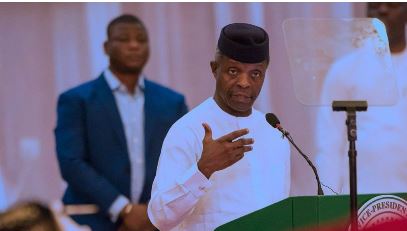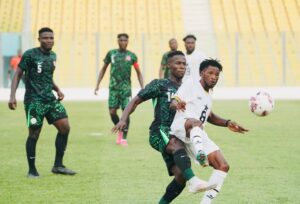
Yemi Osinbajo
Questioning the legality of the presidential order restricting movements in the FCT, Lagos and Ogun States is quite unnecessary as the action taken is not only important but very well backed by extant Nigerian laws, according to Vice President Yemi Osinbajo, SAN.
Prof. Osinbajo made this observation in Abuja while responding to questions on Monday at the Google Hangout programme organized by HACK COVID-19 Call Centre – a private sector initiative supporting Nigeria’s battle against the pandemic.
According to the Vice President, “regarding the legality of the shutdowns announced by the President yesterday, -Sunday-I think it is entirely legal. These steps are proactive, very relevant, important and backed by law.
“I am not so sure some of the people who have commented on the issue have come across the Quarantine Act. There is a Quarantine Act of 1926, it’s been published in all of the Laws of Nigeria, every edition of the Laws of Nigeria, it is there.”
Referring specifically to the part of the legislation that empowers the President to order movement restrictions in any part the country, Prof. Osinbajo said, “what the Act does is that it allows the President to designate any local area, any part of the country, as a place that may be infected or under the threat of a communicable disease, and he can then make regulations of any kind.
“For instance, he can say, people should not go out; no public gatherings etc. So, it is a regulation that gives the President powers and these powers come from the National Assembly because, of course, it is an act of the National Assembly.”
(The Vice President also later explained that by virtue of the constitutional rules, the 1926 Act is deemed to be an Act of the National Assembly.)
“So, the President has extensive powers under the Quarantine Act of 1926. Also, Governors have extensive powers under the same Quarantine Act.”
Prof. Osinbajo urged all interested individuals and groups to personally go through the legislation in order to understand the provisions therein, noting that “it is barely a one page legislation, so it is not particularly difficult to find the relevant provisions and it is not particularly difficult to read, very straightforward. So, the President has all the powers.”
Speaking further about the legal precedent for the President’s ‘no movement order’, Prof. Osinbajo said “many of us are not familiar with the Influenza pandemic that killed several millions around the world in 1918. At that time regulations were made here, very similar to what we have today, although that was under the colonial authorities.
(The Influenza pandemic was referred to as the Spanish Flu and it killed thousands in Nigeria and millions across the world then.)
“They also banned public gatherings, banned gatherings in places of worship then. So, there is even good historical precedence for some of what we are doing today.”
Laolu Akande
Senior Special Assistant to the President on Media & Publicity
Office of the Vice President
31st March 2020
You may be interested

Vitolo Announces Retirement From Football
Webby - December 22, 2024Former Spain forward Vitolo has announced his retirement from football.The former Atletico Madrid, Las Palmas and Sevilla confirmed his retirement…

La Liga: Iheanacho Missing In Real Madrid, Sevilla’s Six-Goal Thriller
Webby - December 22, 2024Super Eagles forward Kelechi Iheanacho was missing in action as Real Madrid defeated Sevilla 4-2 in Sunday’s La Liga game.Iheanacho…

Salah Makes EPL History In Liverpool’s 6-3 Win Vs Spurs
Webby - December 22, 2024Mohamed Salah was the standout performer as he bagged a brace and also provided two assists, in Liverpool’s 6-3 win…


















![American Pastor, David Wilson Seen Eating The Box Of Woman Who Isn’t His Wife [Video]](https://onlinenigeria.com/wp-content/uploads/2019/10/american-pastor-david-wilson-seen-eating-the-box-of-woman-who-isnt-his-wife-video-150x150.jpg)









